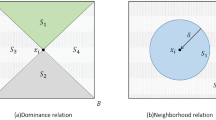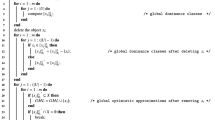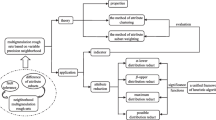Abstract
As a generalized extension of Pawlak’s rough set model, the multigranulation decision-theoretic rough set model in ordered information systems utilizes the basic set assignment function to construct probability measure spaces through dominance relations. It is an effective tool to deal with uncertain problems and widely used in practical decision problems. However, when the scale of dataset is large, it takes a lot of time to characterize the approximations of the target concept, as well as complicated calculation processes. In this paper, we develop a novel model called local multigranulation decision-theoretic rough set in an ordered information system to overcome the above-mentioned limitation. Firstly, to reduce the computing time of the information granule independent of the target concept, we only use the characterization of the elements in the target concept to approximate this target concept. Moreover, the corresponding local multigranulation decision-theoretic rough set in an ordered information system is addressed according to the established local model, and the comparisons are made between the proposed local algorithm and the algorithm of original multigranulation decision-theoretic rough set in ordered information systems. Finally, the validity of the local approximation operators is verified through the experimental evaluation using six datasets coming from the University of California-Irvine (UCI) repository.


Similar content being viewed by others
References
Bansal S (2018) Nature-inspired-based multi-objective hybrid algorithms to find near-OGRs for optical WDM systems and their comparison. In: Handbook of research on biomimicry in information retrieval and knowledge management. IGI Global, pp 175–211
Bansal S, Gupta N, Singh AK (2017) NatureCinspired metaheuristic algorithms to find nearCOGR sequences for WDM channel allocation and their performance comparison. Open Math 15(1):520–547
Bansal S, Singh AK, Gupta N (2017) Optimal golomb ruler sequences generation for optical WDM systems: a novel parallel hybrid multi-objective bat algorithm. J Inst Eng 98(1):43–64
Bansal S, Sharma K (2018) Nature-inspired-based modified multi-objective BB-BC algorithm to find near-OGRs for optical WDM systems and its performance comparison. In: Handbook of research on biomimicry in information retrieval and knowledge management. IGI Global, pp 1–25
Chen J, Zhang YP, Zhao S (2016) Multi-granular mining for boundary regions in three-way decision theory. Knowl Based Syst 91:287–292
Du WS, Hu BQ (2016) Dominance-based rough set approach to incomplete ordered information systems. Inf Sci 346–347:106–129
Du WS, Hu BQ (2017) Dominance-based rough fuzzy set approach and its application to rule induction. Eur J Oper Res 261(2):690–703
Duntsh I, Gediga G (1998) Uncertainty measures of rough set prediction. Artif Intell 106(1):109–137
Fang Y, Min F (2019) Cost-sensitive approximate attribute reduction with three-way decisions. Int J Approx Reason 104:148–165
Greco S, Matarazzo B, Slowinski R (2002) Rough approximation by dominance relations. Int J Intell Syst 17(2):153–171
Greco S, Slwìski R, Yao YY (2007) Bayesian decision theory for dominance-based rough set approach. Rough Sets Knowl Technol 4481:134–141
Hu XH, Cercone N (1995) Learning in relational databases: a rough set approach. Comput Intell 11(2):323–338
Jeon G, Kim D, Jeong J (2016) Rough sets attributes reduction based expert system in interlaced video sequences. IEEE Trans Consum Electron 52(4):1348–1355
Li SY, Li TR (2015) Incremental update of approximations in dominance-based rough sets approach under the variation of attribute values. Inf Sci 294:348–361
Li WT, Xu WH (2015) Multigranulation decision-theoretic rough set in ordered information system. Fundam Inform 139(1):67–89
Li HX, Zhang LB, Huang B, Zhou XZ (2016) Sequential three-way decision and granulation for cost-sensitive face recognition. Knowl Based Syst 91:241–251
Li WT, Pedrycz W, Xue XP, Xu WH, Fan BJ (2018) Distance-based double-quantitative rough fuzzy sets with logic operations. Int J Approx Reason 101:206–233
Li WT, Pedrycz W, Xue XP et al (2018) Fuzziness and incremental information of disjoint regions in double-quantitative decision-theoretic rough set model. Int J Mach Learn Cybern. https://doi.org/10.1007/s13042-018-0893-7
Liang DC, Pedrycz W, Liu D, Hu P (2015) Three-way decisions based on decision-theoretic rough sets under linguistic assessment with the aid of group decision making. Appl Soft Comput 29:256–269
Liang DC, Liu D, Kobina A (2016) Three-way group decisions with decision-theoretic rough sets. Inf Sci 345(1):46–64
Li W, Miao DQ, Wang WL et al (2010) Hierarchical rough decision theoretic framework for text classification. In: IEEE international conference on cognitive informatics, pp 484–489
Liu D, Yao YY, Li TR (2011) Three-way investment decisions with decision-theoretic rough sets. Int J Comput Intell Syst 4(1):66–74
Liu D, Li TR, Liang DC (2012) Three-way government decision analysis with decision-theoretic rough sets. Int J Uncertain Fuzziness Knowl Based Syst 20(supp01):119–132
Ma WM, Sun BZ (2012) Probabilistic rough set over two universes and rough entropy. Int J Approx Reason 539(4):608–619
Pawlak Z (1982) Rough set. Int J Comput Inf Sci 11(5):341–356
Pawlak Z (1992) Rough sets: theoretical aspects of reasoning about data. Kluwer Academic Publishers, Alphen ann den Rijn
Pawlak Z, Wong SKM, Ziarko W (1988) Rough sets: probabilistic versus deterministic approach. Int J Man Mach Stud 29(1):81–95
Pedrycz W (2013) Granular computing: analysis and design of intelligent systems. CRC Press, Boca Raton
Qian YH, Liang JY (2006) Rough set method based on multi-Granulations. IEEE Int Conf Cognit Inform 1:297–304
Qian YH, Zhang H, Sang YL et al (2014) Multigranulation decision-theoretic rough sets. Int J Approx Reason 55(1):225–237
Qian YH, Li SY, Liang JY et al (2014) Pessimistic rough set based decisions: a multigranulation fusion strategy. Inf Sci 264:196–210
Qian YH, Liang XY, Lin GP et al (2017) Local multigranulation decision-theoretic rough sets. Int J Approx Reason 82:119–137
Qian J, Liu CH, Yue XD (2019) Multigranulation sequential three-way decisions based on multiple thresholds. Int J Approx Reason 105:396–416
Shao MW, Zhang WX (2005) Dominance relation and rules in an incomplete ordered information system. Int J Intell Syst 20(1):13–27
Sun BZ, Ma WM, Li BJ, Li XN (2016) Three-way decisions approach to multiple attribute group decision making with linguistic information-based decision-theoretic rough fuzzy set. Int J Approx Reason 93:424–442
Susmaga R (2014) Reducts and constructs in classic and dominance-based rough sets approach. Inf Sci 271:45–64
Xu WH (2013) Ordered information systems and rough sets theory. Science Press, Beijing
Xu WH, Li WT (2016) Granular computing approach to two-way learning based on formal concept analysis in fuzzy datasets. IEEE Trans Cybern 46(2):366–379
Xu WH, Yu JH (2017) A novel approach to information fusion in multi-source datasets: a granular computing viewpoint. Inf Sci 378:410–423
Xu WH, Zhang XY, Zhong JM et al (2010) Attribute reduction in ordered information systems based on evidence theory. Knowl Inf Syst 25(1):169–184
Yao YY (1998) Generalized rough set models. Rough Sets Knowl Discov 1:286–318
Yao YY (2007) Decision-theoretic rough set models. Rough Sets Knowl Technol 4481:1–12
Yao YY (2008) Probabilistic rough set approximation. Int J Approx Reason 49(2):255–271
Yao YY (2009) Three-way decision: An interpretation of rules in rough set theory. Rough Sets Knowl Technol 5589:642–649
Yao YY, Wong SKM (1992) A decision theoretic framework for approximating concepts. Int J Man Mach Stud 37(6):793–809
Yao YY, Zhou B (2010) Naive Bayesian rough sets. Rough Sets Knowl Technol 6401:719–726
Yu JH, Xu WH (2017) Incremental knowledge discovering in interval-valued decision information system with the dynamic data. Int J Mach Learn Cybern 8(1):849–864
Yu H, Liu ZG, Wang GY (2014) An automatic method to determine the number of clusters using decision-theoretic rough set. Int J Approx Reason 55(1):101–115
Yu JH, Zhang B, Chen MH, Xu WH (2018) Double-quantitative decision-theoretic approach to multigranulation approximate space. Int J Approx Reason 98:236–258
Zhang XY, Miao DQ (2017) Three-way attribute reducts. Int J Approx Reason 88:401–434
Zhang HY, Leung Y, Zhou L (2013) Variable-precision-dominance-based rough set approach to interval-valued information systems. Inf Sci 244:75–91
Ziarko W (1993) Variable precision rough set model. J Comput Syst Sci 46(1):39–59
Acknowledgements
We would like to express our thanks to the Editor-in-Chief, handling associate editor and anonymous referees for his/her valuable comments and constructive suggestions. This work is supported by the National Natural Science Foundation of China (No. 61772002).
Author information
Authors and Affiliations
Corresponding author
Ethics declarations
Conflict of interest
The authors declare no conflict of interest.
Additional information
Communicated by V. Loia.
Publisher's Note
Springer Nature remains neutral with regard to jurisdictional claims in published maps and institutional affiliations.
Rights and permissions
About this article
Cite this article
Zhang, J., Zhang, X., Xu, W. et al. Local multigranulation decision-theoretic rough set in ordered information systems . Soft Comput 23, 13247–13261 (2019). https://doi.org/10.1007/s00500-019-03868-w
Published:
Issue Date:
DOI: https://doi.org/10.1007/s00500-019-03868-w




